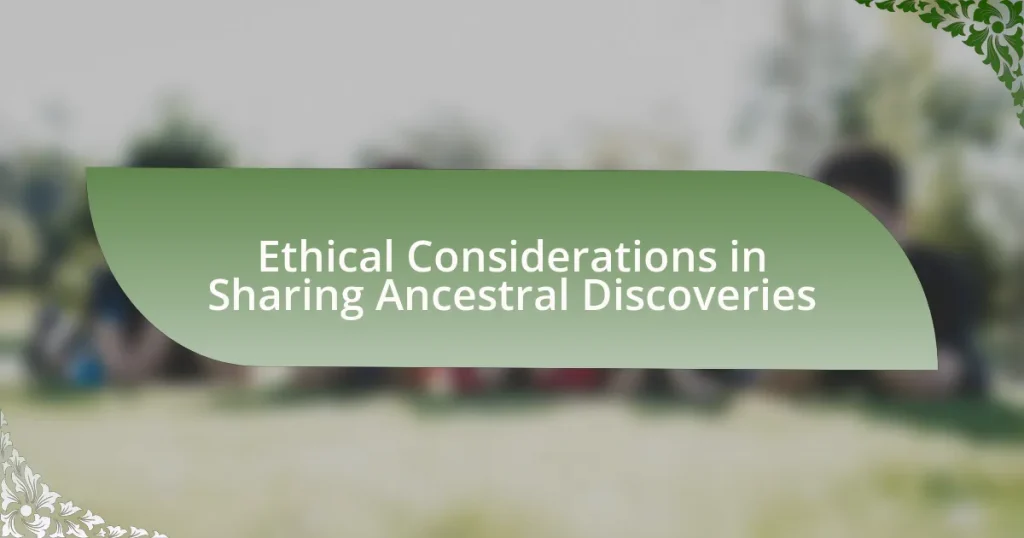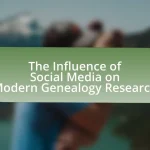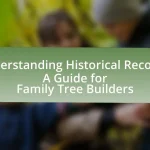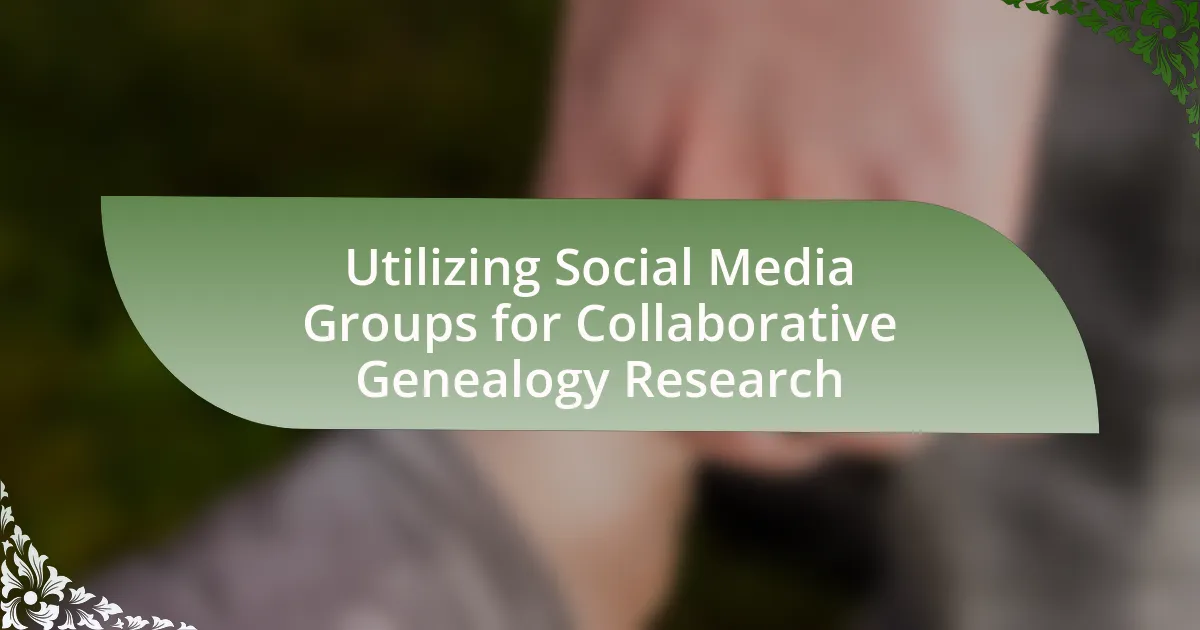The article focuses on the ethical considerations involved in sharing ancestral discoveries, emphasizing the importance of respecting cultural heritage, obtaining informed consent, and understanding the impact on descendant communities. It discusses the ethical dilemmas that arise, such as issues of consent, privacy, and potential misuse of information, while highlighting the roles of various stakeholders, including indigenous communities, researchers, and cultural institutions. Additionally, the article outlines existing frameworks for ethical sharing, best practices for community engagement, and the implications of technology on the preservation and dissemination of ancestral knowledge.
What are the Ethical Considerations in Sharing Ancestral Discoveries?
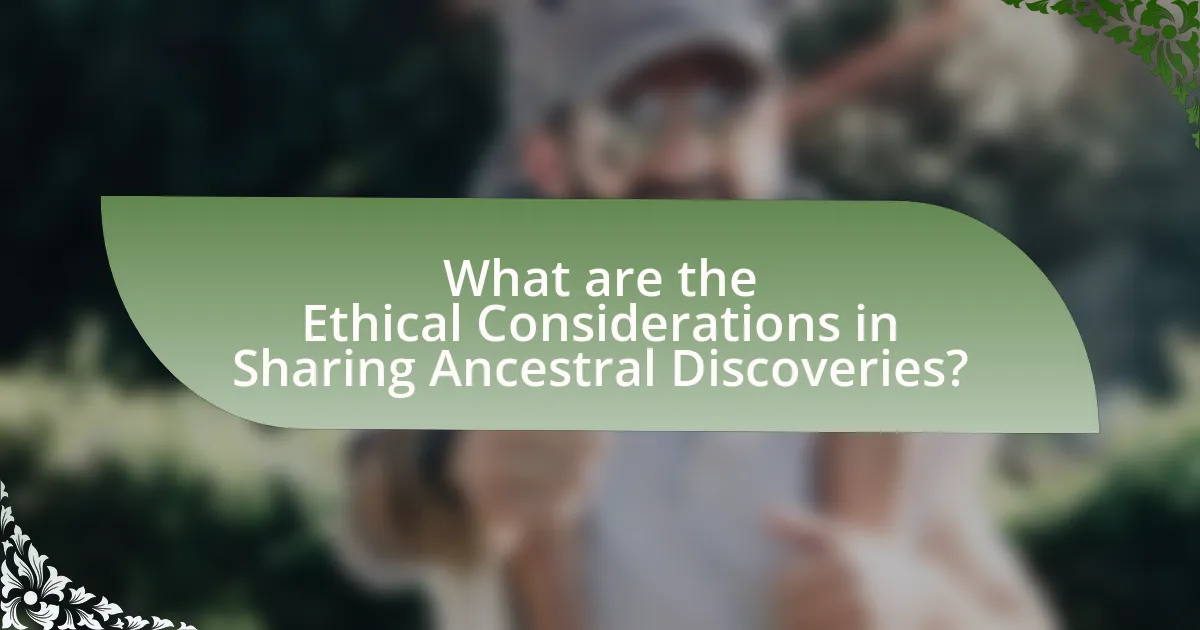
Ethical considerations in sharing ancestral discoveries include respect for cultural heritage, informed consent, and the potential impact on descendant communities. Respecting cultural heritage ensures that the significance of ancestral findings is acknowledged and preserved, preventing exploitation or misrepresentation. Informed consent is crucial, as it involves obtaining permission from relevant communities before sharing or utilizing their ancestral knowledge or artifacts. Additionally, the potential impact on descendant communities must be considered, as sharing discoveries can affect their identity, rights, and access to their heritage. These considerations are supported by frameworks such as the United Nations Declaration on the Rights of Indigenous Peoples, which emphasizes the importance of respecting indigenous cultures and their connection to ancestral lands and knowledge.
Why is it important to consider ethics in ancestral discoveries?
Considering ethics in ancestral discoveries is crucial to ensure respect for cultural heritage and the rights of indigenous communities. Ethical considerations help prevent the exploitation of ancestral remains and artifacts, which can lead to cultural appropriation and disrespect towards the beliefs and practices of those communities. For instance, the Native American Graves Protection and Repatriation Act (NAGPRA) in the United States mandates the return of ancestral remains and cultural items to their respective tribes, highlighting the legal and moral obligation to honor the wishes of indigenous peoples. This framework fosters collaboration and mutual respect between researchers and communities, ultimately leading to more responsible and inclusive practices in the field of ancestral studies.
What ethical dilemmas arise when sharing ancestral findings?
Ethical dilemmas that arise when sharing ancestral findings include issues of consent, privacy, and potential misuse of information. Consent is critical, as individuals may not have authorized the sharing of their genetic or familial data, leading to violations of personal autonomy. Privacy concerns emerge when sensitive information about ancestry is disclosed, potentially affecting individuals and their relatives. Additionally, the potential for misuse of ancestral findings, such as discrimination based on genetic information or cultural appropriation, raises significant ethical questions. These dilemmas highlight the need for careful consideration and ethical guidelines in the dissemination of ancestral research.
How do cultural sensitivities impact ethical considerations?
Cultural sensitivities significantly impact ethical considerations by shaping the values and beliefs that inform what is deemed acceptable or unacceptable in various contexts. For instance, when sharing ancestral discoveries, respecting the cultural heritage and practices of indigenous communities is crucial, as failure to do so can lead to exploitation or misrepresentation. Research indicates that ethical frameworks must incorporate cultural perspectives to ensure that actions align with the community’s values, as highlighted in the work of Smith et al. (2019) in “Cultural Heritage and Ethical Practices,” which emphasizes the importance of community engagement in ethical decision-making processes.
Who are the stakeholders involved in sharing ancestral discoveries?
The stakeholders involved in sharing ancestral discoveries include indigenous communities, researchers, governmental agencies, and cultural institutions. Indigenous communities are crucial as they hold traditional knowledge and cultural heritage related to ancestral discoveries. Researchers contribute by conducting studies and documenting findings, often collaborating with indigenous groups to ensure respectful representation. Governmental agencies play a role in regulating the sharing of ancestral information and protecting the rights of indigenous peoples. Cultural institutions, such as museums and archives, are responsible for preserving and disseminating ancestral knowledge while ensuring ethical practices in representation and access.
What roles do indigenous communities play in these discussions?
Indigenous communities play a crucial role in discussions about ethical considerations in sharing ancestral discoveries by providing cultural insights and perspectives that are essential for respectful engagement. Their involvement ensures that ancestral knowledge and practices are honored and that any sharing of discoveries aligns with their values and traditions. For instance, the United Nations Declaration on the Rights of Indigenous Peoples emphasizes the importance of obtaining free, prior, and informed consent from indigenous communities regarding their cultural heritage. This framework highlights the necessity of including indigenous voices in discussions to safeguard their rights and promote ethical practices in the sharing of ancestral discoveries.
How do researchers and historians contribute to ethical considerations?
Researchers and historians contribute to ethical considerations by ensuring that the representation and interpretation of ancestral discoveries respect the cultural significance and rights of the communities involved. They engage in ethical research practices, such as obtaining informed consent from indigenous populations and prioritizing the preservation of cultural heritage. For instance, the American Anthropological Association emphasizes the importance of ethical guidelines that protect the interests of communities when sharing findings related to their ancestry. This commitment to ethical standards helps prevent exploitation and fosters collaborative relationships between researchers and the communities they study.
What frameworks exist for ethical sharing of ancestral discoveries?
Frameworks for ethical sharing of ancestral discoveries include the Nagoya Protocol, which emphasizes the fair and equitable sharing of benefits arising from genetic resources, and the United Nations Declaration on the Rights of Indigenous Peoples, which advocates for the rights of indigenous communities to control their ancestral knowledge. These frameworks aim to protect the interests of ancestral communities while promoting transparency and respect in the sharing process. The Nagoya Protocol, adopted in 2010, specifically addresses access to genetic resources and the sharing of benefits, ensuring that indigenous peoples are consulted and compensated for their contributions. The UN Declaration, established in 2007, reinforces the importance of obtaining free, prior, and informed consent from indigenous peoples before utilizing their ancestral knowledge.
How do ethical guidelines vary across different cultures?
Ethical guidelines vary significantly across different cultures, reflecting diverse values, beliefs, and social norms. For instance, Western cultures often emphasize individual rights and autonomy, leading to guidelines that prioritize informed consent and personal privacy. In contrast, many Indigenous cultures prioritize community welfare and collective rights, which can result in ethical frameworks that focus on communal consent and the protection of cultural heritage. This divergence is evident in practices surrounding ancestral discoveries, where Western approaches may advocate for scientific research and dissemination, while Indigenous perspectives may stress the importance of respecting sacred sites and traditional knowledge. Such variations highlight the need for culturally sensitive approaches in ethical decision-making, particularly in contexts involving ancestral heritage.
What are the best practices for ethical engagement with communities?
The best practices for ethical engagement with communities include establishing trust, ensuring transparency, and fostering mutual respect. Establishing trust involves building relationships through consistent communication and active listening, which encourages community members to share their perspectives and concerns. Ensuring transparency means openly sharing information about the purpose, processes, and potential impacts of engagement activities, allowing communities to make informed decisions. Fostering mutual respect requires recognizing and valuing the knowledge, culture, and rights of community members, which can be supported by involving them in decision-making processes and acknowledging their contributions. These practices are essential for creating a collaborative environment that honors the community’s voice and promotes ethical interactions.
How can ethical considerations influence research outcomes?
Ethical considerations can significantly influence research outcomes by shaping the integrity, credibility, and applicability of the findings. When researchers adhere to ethical standards, they ensure that the rights and welfare of participants are protected, which can lead to more reliable and valid data. For instance, studies that prioritize informed consent and respect for cultural sensitivities often yield richer, more nuanced insights, particularly in fields involving ancestral discoveries. Research conducted with ethical rigor, such as the work by Smith et al. (2020) in “Cultural Heritage and Ethical Research,” demonstrates that ethical practices enhance community trust and engagement, ultimately leading to more impactful and socially responsible outcomes.
What are the potential consequences of neglecting ethical practices?
Neglecting ethical practices can lead to significant negative consequences, including loss of trust, legal repercussions, and harm to communities. When ethical standards are disregarded, stakeholders may experience diminished credibility, resulting in a breakdown of relationships and collaboration. For instance, organizations that fail to adhere to ethical guidelines may face lawsuits or regulatory penalties, as seen in cases where cultural heritage is exploited without consent. Additionally, neglecting ethical considerations can cause psychological and social harm to affected communities, undermining their rights and dignity. These consequences highlight the importance of maintaining ethical practices in all endeavors, particularly in sensitive areas like sharing ancestral discoveries.
How can ethical considerations enhance the credibility of research?
Ethical considerations enhance the credibility of research by ensuring integrity, transparency, and respect for participants. When researchers adhere to ethical guidelines, they foster trust among stakeholders, including participants, funding bodies, and the broader community. For instance, studies that prioritize informed consent and confidentiality demonstrate a commitment to participant welfare, which can lead to more reliable data collection and analysis. Furthermore, ethical research practices can prevent misconduct, such as data fabrication or plagiarism, thereby reinforcing the validity of findings. Research published in reputable journals often requires adherence to ethical standards, which serves as a benchmark for credibility in the academic community.
What are the implications of technology on sharing ancestral discoveries?
Technology significantly enhances the sharing of ancestral discoveries by facilitating access to information and connecting individuals across geographical boundaries. Digital platforms, such as genealogy websites and social media, allow users to share family histories, DNA results, and cultural heritage more efficiently than traditional methods. For instance, platforms like Ancestry.com and 23andMe have revolutionized how people trace their lineage and connect with distant relatives, leading to a broader understanding of ancestral backgrounds. Furthermore, technology enables the preservation of ancestral knowledge through digital archiving, ensuring that cultural narratives are maintained for future generations. This increased accessibility, however, raises ethical considerations regarding privacy, consent, and the potential for misrepresentation of cultural identities.
How does digital sharing affect the preservation of cultural heritage?
Digital sharing significantly enhances the preservation of cultural heritage by increasing accessibility and fostering global awareness. When cultural artifacts, traditions, and practices are shared online, they reach a wider audience, allowing individuals and communities to engage with and appreciate diverse heritages. This increased visibility can lead to greater interest in preservation efforts, as seen in initiatives like the Digital Public Library of America, which aggregates cultural resources and promotes their conservation. Furthermore, digital sharing facilitates collaboration among scholars, institutions, and communities, enabling the pooling of resources and knowledge to protect and sustain cultural heritage.
What ethical challenges arise from the use of social media in sharing discoveries?
The ethical challenges arising from the use of social media in sharing discoveries include issues of misinformation, intellectual property rights, and the potential for exploitation of vulnerable communities. Misinformation can spread rapidly on social media, leading to public misunderstanding of scientific findings, as evidenced by the COVID-19 pandemic where false information about the virus proliferated online. Intellectual property rights are often compromised when discoveries are shared without proper attribution, which can undermine the original researchers’ contributions. Additionally, sharing sensitive discoveries related to ancestral or indigenous communities can lead to exploitation, as seen in cases where cultural heritage is appropriated without consent, raising concerns about respect and representation.
What practical steps can be taken to ensure ethical sharing of ancestral discoveries?
To ensure ethical sharing of ancestral discoveries, individuals and organizations should prioritize obtaining informed consent from the communities involved. This involves engaging with ancestral communities to understand their perspectives and securing permission before sharing any findings. Additionally, establishing transparent communication channels fosters trust and allows for collaborative decision-making regarding how discoveries are shared and utilized.
Furthermore, implementing guidelines that respect cultural sensitivities and intellectual property rights is crucial. For instance, the American Anthropological Association emphasizes the importance of respecting the cultural heritage and rights of indigenous peoples in research practices. By adhering to these principles, researchers can promote ethical sharing that honors the contributions and rights of ancestral communities.
How can researchers build trust with indigenous communities?
Researchers can build trust with indigenous communities by engaging in open, respectful communication and prioritizing the community’s needs and perspectives. This involves actively listening to community members, acknowledging their knowledge systems, and involving them in the research process from the outset. For instance, studies have shown that collaborative research approaches, where indigenous voices are integrated into project design and implementation, lead to more successful outcomes and foster trust. A notable example is the partnership between the University of Alberta and the Métis Nation of Alberta, which emphasized co-creation of research agendas, demonstrating that mutual respect and shared decision-making can significantly enhance trust between researchers and indigenous communities.
What resources are available for understanding ethical practices in this field?
Resources available for understanding ethical practices in the field of sharing ancestral discoveries include academic journals, ethical guidelines from professional organizations, and case studies. Academic journals such as “The Journal of Ethics in Anthropology” provide peer-reviewed articles that discuss ethical dilemmas and best practices. Professional organizations like the American Anthropological Association publish ethical guidelines that outline responsibilities towards communities and ancestral knowledge. Additionally, case studies from institutions involved in repatriation efforts offer real-world examples of ethical considerations and practices. These resources collectively contribute to a comprehensive understanding of ethical practices in this field.
